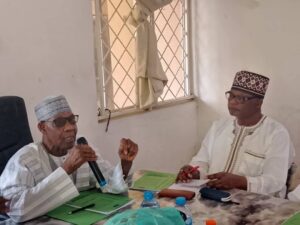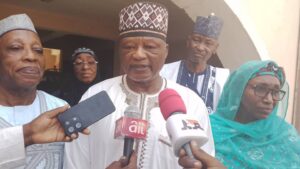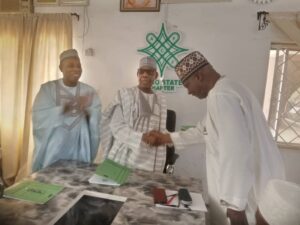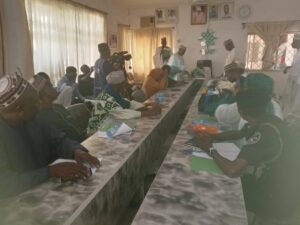Headlines
Forgery, illegal taxes, extortion, corruption: Realities of taxing tricycle riders in Kano State Part 1

Despite the several allegations and controversies surrounding the operations of the Baffa Babba – led Kano Road Transport Agency (KAROTA) and the Abdullahi Umar Ganduje government, there was never any real investigation into the KAROTA daily taxes on tricycle (better known as Adaidaita-sahu) operators. This investigation x – rays KAROTA’s daily tricycle tax collection and unearths hitherto unreported cases of illegal tax collection in local councils, extortion and embezzlement of funds collected as tax and tracker fees from tricycle riders in the state.
By Zulaiha Danjuma
There was no love lost between Tricycle (popularly known as Adaidaita) riders and The Kano Road Traffic Agency (KAROTA) during the immediate past administration in Kano State, as there was were several allegations of extortion and animosity between them.
KANO FOCUS recalls that in 2021, the former Governor of Kano state, Abdullahi Umar Ganduje, through KAROTA introduced a N120 daily tricycle tax collection system for tricyclists in the state.

Soon after this, tricycle riders in Kano went on two massive strike actions. The first was in February 2021, while the second was on January 10, 2022. Both strikes were a culmination of the built-up animosity between KAROTA and Tricyclists.
The major issue was over the agency’s compulsory daily tax collection, issuance of paper sticker instead of electronic tracking devices promised by the government as well as perceived high operational licensing of tricycle riders.
Prior to the strike actions, tricycle riders in 2020 had taken the then Managing Director of KAROTA, Baffa Babba Dan-Agundi, to court over the issuance of what they called fake tracking machines. The case was ruled in favor of Dan – Agundi.
KANO FOCUS investigations showed that the tricycle operators might have been right in alleging corruption in the transport tax system in the state, especially the daily tricycle tax collection. The newspaper got exclusive video footage of young boys who acted as sales agents of KAROTA issuing fake tricycle tax tickets.
The footage of close to six minutes showed more than 20 young boys between the ages of 9 to 22 admitting to selling daily tax tickets to unsuspecting tricycle riders around the Ja’en area of Kano State.
The footage obtained from an inside source within the KAROTA was never publicly released before now, despite the it being in existence since 2020.
In an interview with the Public Relations officer (PRO) of KAROTA, Nabulisi Kofar Na’isa, who worked in the same capacity as PRO under Dan-Agundi, he said the case was not brought to the public at that time because the management did not want to escalate issues and cause unrest among citizens.
He, however, added that the boys were handed over to the police shortly after they were questioned at the KAROTA offices.
“The boys were taken to police headquarters Bompai and were subsequently taken to court,” he said.
KANO FOCUS investigated the claim of KAROTA taking the boys to the Bompai police station.
The reporter reached out severally in person, messages and through calls to the Kano state police command Public Relations Officer (PRO), SP Abdullahi Haruna Kiyawa to verify the claims by the KAROTA. The Police PRO he agreed to the claim that some boys were brought in by the agency on ticket forgery offences, but he did not provide any added information as he said the command was preparing to have its routine press brief that same day, December 29,2023. He added that the issue was over two years old, and he needed time to look through the case file.
SP Kiyawa, however, agreed to speak to the reporter via WhatsApp to give the details of the case but did not. The reporter again visited the Bompai Police command later to get a detailed report from the police but was unable to see or reach the PRO by phone. As various calls made to him went unanswered.
Officers at the command had directed the reporter to the Bompai Command recruit screening ground, however, on reaching there, the Police PRO could not be reached as both calls made to him by the reporter and other police officers went on answered.
KAROTA recruited Motor pack boys to sell tickets and collect tax from tricycle riders.
“I sold tax tickets to Keke riders,” a motor park goods loader and Sabon Gari Market tax collector, Sani Ibrahim, said.
Ibrahim, like many of his colleagues, make out themselves to be members of the Kano State Tricycle Association Forum (KASTAF). However, many of them are found in motor/tricycle bus stops within the city without owning or driving tricycles themselves, but instead they collect taxes at marketplaces and issue tickets or load goods for people at the market.

Investigation revealed that the KASTAF was chosen by the then KAROTA management to act as middlemen between them and Keke riders in the state for ease of collection.
They acted in that capacity and collected tickets from the office of KAROTA, while they stood at various points within the city issuing tickets in exchange for money from tricycle riders.
“We were recruited to start issuing daily tax tickets to tricycle riders shortly after the KASTAF own tickets issuance was stopped” Ibrahim said.
“Back then we sold the association tickets at N50 each, but when we were stopped from doing that, we were then given the Kano State daily tickets to sell instead,” Ibrahim said.
He, however, did not comment on who stopped them from collecting the former association tax of N50. During the investigation it was gathered that the N50 tickets sold at that time were not compulsory; some tricycle riders declined to pay for them while others did, KANO FOCUS gathered.
Ibrahim narrated that when members of the KASTAF were stopped from collecting the N50 tickets, they were then approached by their leadership to resume collection of the Kano State and KAROTA daily tickets.
“Daily, we collected a bundle of tickets, a bundle contains 100 pieces of tickets. At the close of day, if we get successful in selling off the whole 100 pieces, we will get N1,000 as commission,” Ibrahim said.
However, when they were unable to sell the whole bundle, they were given stipends from whatever they sold for the day.
“We don’t have a choice, for instance if the commission of overall sells for a day came up to N200 that all we got.”
“We help people in carrying their goods to supplement little sells we made from selling the tickets,” he added.
Aside from the KASTAF members, younger boys were also sent all over the state acting as tax collectors. It was gathered that some of the KASTAF members recruited young boys within the community to sells those tickets they collected from the KAROTA.
Could this be how the KAROTA daily tricycle tax tickets got fabricated?
In an interview with Na’isa, KOROTA spokesman, he insisted that the agency did not know about the recruitment of personnel who were not members of the KASTAF.
He, however, admitted that the KAROTA recruited KASTAF because the agency was understaffed and could not have covered the distribution of the tickets and the collection of taxes from Keke operators in most of the state.
Before KAROTA started collecting taxes through KASTAF members, the agency and the Kano State Internal Revenue Service (KIRS) were responsible for collection of taxes from the riders.
According to Director, Government Business at the KIRS, Sammani Ibrahim, the agency engaged technical advisors who were given the mandate to collect N100 from the tricycle operators.
Sammani went on to disclose that KAROTA on its part, being the road traffic agency with the mandate for enforcement of tax collection process, was the only ones who could act as enforcers of tax and not KIRS.
“Our team could not stop vehicles on the streets to demand they pay taxes so the KAROTA men were told by the government to act as enforcement agents, as by law we cannot go on road to stop any vehicle to collect any revenue,” he explained.
He, however, added that shortly as the process began, KIRS discontinued from overseeing money collection. According to him, the then MD of KAROTA Baffa Babba Dan Agundi, argued that his men would do better in the daily tricycle tax collection, than the KIRS and its team.
“Being that Baffa and the then governor had a close relationship, he sought the government’s approval to have collection of the daily tax solely handled by the KAROTA and they were given approval by the governor,” he said.
Back in late 2021, KIRS had its technical team drawn from consultants stationed at designated roads and streets they used Point of Sale Machine, popularly known as POS, to collect the daily tricycle tax from Keke operatives.
“We had our personnel at strategic spots within the state, where tricycle drivers go to pay the daily tax using a point-of-sale machine (POS),” Mr. Ibrahim said.
“After the payment, our personnel gave the Keke drivers a receipt of payment generated from the POS machine” he added.
The process of collection by the KIRS did not offer ticket stamps to tricycle riders as proof of payment, instead the Keke operatives got receipts to validate their payments through the POS operators.
Sammani told KANO FOCUS that tricycles paid N100 as daily tricycle taxes but the riders clarified that they paid between N120 and N130 daily for the tickets.
The piles of ticket stamps obtained during this investigation showed that all Kano State KAROTA tickets had N100 price tag on them.

KAROTA tickets
Na’isa, confirmed that the tickets were sold at N120. He, however, claimed that the extra N20 fees not indicated on the ticket stamps was taken as fee by the Tricycle union members who acted as middlemen between the KAROTA and the riders.
“After their sales, they removed the N20 on top of the N100 on each ticket sold and brought the remaining money in person to the KAROTA headquarters” he said.
The KAROTA spokesperson’s claim was vehemently denied by Ibrahim and his colleague, Sadi Isa, both KASTAF members, who were part of the process of distributing Kano State daily tickets and collection of daily tax from tricycle riders.
“When we sold a bundle of the tickets, which were 100 pieces per bundle, amounting to N12,000 naira daily, we were only given N1,000 if we sold all 100 pieces of tickets” Ibrahim and Isa said.
“The allegation that N20 on top of each ticket was ours is not true. All money was taken to KAROTA. We don’t remove anything, it is them who give us commission based on our sales, ” Sani said.
Back in 2021, the Tricyclists and the KAROTA management made an agreement on the amount to be paid as daily tricycle tax. The agreed amount was N100 to be paid to the Kano State Internal Revenue Service, and N30 as charges for the POS operators.
This was based on a February 23, 2021, agreement between the Kano state Chairman of the Amalgamated Commercial Tricycle and Motorcycle Owners, Repairs and Riders Association (ACOMORAN) Alhaji Mansur Tanimu, and the then Kano State government and KAROTA. This was the beginning of the KAROTA daily Keke tax collection in Kano state.
Illegal taxing of tricycle riders in Gwarzo Local Government
Tricycle operatives in Gwarzo town are not as opposed to paying the transport tax as those in Kano metropolis. Here, the tricycle rider’s community is tight knit one apparently due to the small number of tricycles available (just 100) and the fact that the commercial tricycles are primarily situated directly by the town’s only market.
KANO FOCUS gathered that contrary to expectation, the collection of tricycle tax is not done by the Kano Road Traffic Agency (KAROTA) but allegedly by Nigeria Security and Civil Defense Corps (NSCDS) Gwarzo Division.

NSCDC office, Gwarzo division
Unlike Kano metropolis where KAROTA oversees all road compliance and enforcement activities, in Gwarzo town, the NSCDS is responsible for controlling vehicular movements and enforcement of disciplinary levy against Keke parked by the roadside to pick up passengers.
Speaking to the Leader of the commercial tricycle riders in Gwarzo town, Mr. Hassan Abdullahi, he alleged that the Gwarzo Local Government Secretariat was working in cahoot with the NSCDS to collect a daily levy of N50 from commercial tricycle riders in the town.
According to Abdullahi, the N50 Levy has been imposed since October 2023.
He further revealed that there is a recent demand by the NSCDS on commercial tricycle riders in Gwarzo to leave the Gwarzo Market environs and other roadsides to be stationed inside the town’s motor park only.
KANO FOCUS gathered that the NSCDS in Gwarzo demands for commercial tricycle riders to be permanently stationed inside the motor park and have the motor park boys load in passengers for them.
“We were told that we should no longer stay on the market side or any other road to carry passengers by ourselves.
We were directed that the motor pack boys will be the ones to load passengers for us, and we must be stationed inside the pack too,” Abdullahi lamented, amid a crowd of fellow commercial tricycle riders in Gwarzo town.
“The NSCDS have stationed their personnel on the road. If they see any commercial tricycle rider by the road picking up a passenger that person will be arrested,” he added.
KANO FOCUS further gathered that it was the Gwarzo Local Government Secretariat authority that stationed the NSCDS personnel on the roads to collect a fine of N5,000 Naira from any Keke rider seen picking up passenger on the road.
Abdullahi attested to that being the situation of this currently at the town from morning to 6pm in the evening.
KANO FOCUS inquired from the Keke riders whether they sought to find out from the Secretariat and the NSCDS on what the N50 daily levy was meant for.
According to Abdullahi, the Keke riders and the NSCDS boss in Gwarzo town had three separate meetings.
“At the meetings the man kept saying that he was instructed not to allow any Keke rider by the roadside.
“They also never told use what the N50 levy collected will be used for, and if a Keke man is sited on a roadside, then that person will definitely pay N5,000 Naira,” he said.
Inquiring into the identity of the NSCDS boss at Gwarzo, nobody knew his name as the town people said he did not reside in the town but comes and goes.
“He is new, he was not the one who was the NSCDS boss before, all these issues started in October which is also about the time he also started coming here,” Mr. Abdullahi said.
Investigations also revealed that the Keke riders pay to the NSCDS and secretariat staff the N50 levy manually after which they get a paper slip.
However, the slip could not be obtained from the Keke men who say they discard them as soon as they are given.
“The secretariat did not allocate a Keke pack for us, the market side and the roadside is where we pick passengers from. Everybody knows that tricyclists get passengers on the go, it’s not possible to have us permanently stationed at a place far from where passengers need our services,” Abdullahi reasoned.
“And the N5,000 charged by the NSCDS for standing by the road we do not know where the funds are sent to, whether it’s with the NSCDS or the Gwarzo Local Government Secretariat that takes it, we don’t know,” he said.
In a bid to also hear from the NSCDS in Gwarzo, our reporter went to the major road where they mounted a stand, but they were surprisingly missing even though the reporter had earlier noticed them while arriving the town.
The reporter proceeded to their NSCDS divisional office in the town but was also met by an empty office, with no single personnel in sight.
However, the Gwarzo Local Government Secretariat confirmed the collection of the N50 levy from Keke riders in the town. According to the Revenue Officer at the Gwarzo Local Government secret Safi’u Mande Shanono, the collection is with agreement from the Keke riders.
“The Keke riders obstruct the roadside, that was why the LGA decided that they should relocate inside the motor pack because where they reside is basically on the road.
“That was when the Keke riders agreed to be paying N50 as levy,” Mr. Shanono said.
When KANO FOCUS enquired what the LGA plans to do with the levy collected from Keke riders the Gwarzo LGA Revenue officer could not specify any particular project the money will be channeled toward. He insisted that the levy collected was a tax, just as every other one collected by the government.
During the interview with Shanono enquires was made into who manually acts as the tax collectors from the Keke riders. He confirmed that the tax collectors were not LG Secretariat personnel, but casual workers recruited by the Secretariat for the purpose.
“The collectors are committee members, the committee members are not LGA staff, they are like casual personnel recruited. When issues of collection of tax come, we do not only work with LGA staff.”
“We work with various people. Some of the casual staff brought into the process were brought in by politicians to come to be part of the collection process,” Shanono disclosed.
When KANO FOCUS dug deeper to enquire on the role that politicians play in the levy collections process, Shanono explained that in any government, politicians bring in some of their people to work with LGA staff to oversee and collect taxes.
He went on to say that the heads of the Keke Riders Association were the ones who collect the levy stamps from the LGA and sell to the Keke riders.
“We had a sit down with the Keke Riders Association heads who agreed to not only give the levy stamps to riders, but they collected N20 off the N50 collected and remit N30 to the local government,” Shanono revealed.
KANO FOCUS discovered that the Gwarzo Local Government Secretariat wis re responsible for printing the levy stamps.
Shanono also confirmed to selling levy stamps worth N12,000 himself.
“The money I received personally was N3,000 and N9,000 respectfully and the money was deposited into the local government account” he said.
According to him the levy collection started for a while then it was halted before it began again a few days before the reporter visited the town.
“The collection was stopped for a while because of the shortage of passengers available for the Keke riders convey,” he said.
However, Shanono denied the allegation that the council recruited members of NSCDS to collect taxes from the Keke riders.
“It is not true that we employed the services of NSCDS in the town to collect the levy from Keke riders. But I know that there were some NSCDS personnel who came and stopped Keke riders from standing and packing on the roadsides.”
“I do not also know about the NSCDS collecting taxes or levies from Keke riders in Gwarzo” he affirmed.
This report was done with Support from the International Centre for Investigative Reporting, ICIR

Headlines
Governor Yusuf Signs Laws Establishing Four New Agencies in Kano

Mukhtar Yahya Usman
Kano State Governor, Alhaji Abba Kabir Yusuf, has signed into law four landmark bills that establish new agencies designed to strengthen institutional frameworks and accelerate sustainable development across the state.
The announcement was made in a statement issued on Thursday by the Governor’s spokesperson, Sunusi Bature Dawakin Tofa.
The newly signed laws provide for the establishment of the following agencies:
1. Kano State Protection Agency (KASPA)

2. Kano State Signage and
Advertisement Agency (KASIAA)
3. Kano State Information and Communication Technologies Development Agency (KASITDA)
4. Kano State Small and Medium Enterprises Development Agency (KASMEDA)
These laws, which are now part of the Kano State legal framework, are expected to stimulate innovation, support small businesses, regulate signage and advertising, and enhance public protection and service delivery.
Governor Yusuf described the signing as a significant step toward realizing his administration’s vision of a modern, inclusive, and economically vibrant Kano.
He emphasized that the new agencies will play a crucial role in job creation, investment attraction, and the efficient implementation of government initiatives.
“Our mission is to lay a solid foundation for a greater Kano. These laws go beyond policy — they are key instruments of transformation that will help drive our development agenda,” the Governor stated.
He also issued a strong warning that violations of the provisions of these laws will be met with strict penalties, reaffirming his administration’s commitment to upholding the rule of law and ensuring compliance.
The establishment of these agencies reflects Governor Yusuf’s continued efforts to reform public institutions, improve governance, and position Kano as a leading center for innovation, entrepreneurship, and sustainable growth.

Headlines
UTME: Kano suspends end of month sanitation exercise

Nasiru Yusuf Ibrahim
In a bid to ensure the smooth conduct of the ongoing Joint Admissions and Matriculation Board (JAMB) examination, the Kano State Government has temporarily suspended the April 2025, End of month sanitation exercise.
KANO FOCUS reports that this decision was taken after careful consideration and consultation with relevant stakeholders, in an effort to allow students of Kano State to write their examination without any hitches.

In a statement issued by the Director Public Enlightenment of the Ministry of Environment and Climate Change, Ismail Garba Gwammaja has quoted the Commissioner of Environment and Climate Change Dr. Dahiru M. Hashim saying that:
“The suspension is aimed at preventing any potential disruptions to the examination process and ensuring that candidates can sit for their exams without any hindrance.”
The Commissioner assured residents that the suspension is temporary for this month, and that the sanitation exercise will resume in its full force next month May 2025, in the state.
The Commissioner however, appeals to residents to cooperate with the authorities and understand the rationale behind this decision.
“We are committed to maintaining a clean and healthy environment, and we will work tirelessly to ensure that our sanitation activities do not conflict with other important events in the state,” the commissioner said.
While Commending the residents for their understanding and cooperation to the present administration, urged them to continue to avoid indiscriminate dumping of waste and cooperates with our sanitation staff to ensure clean and healthy environment always, and pray for the successful conduct of students who will sit for the Joint Admission and Matriculation Board (JAMB).

Headlines
ACF inaugurates security committee in Kano

Nasiru Yusuf Ibrahim
The Kano State Chapter of the Arewa Consultative Forum (ACF) has inaugurated a security committee aimed at strengthening community-based responses to insecurity in the state and wider northern region.
KANO FOCUS reports that the committee was inaugurated on Tuesday at the ACF Secretariat by the Chairman of the ACF Board of Trustees in Kano State, Brigadier General Haliru Akilu (Rtd), who said the initiative was a strategic response to Nigeria’s growing security challenges.


Gen. Halliru Akilu inaugurating Gen. Idris Bello Dambazau while Dr Goni Faruk Umar is watching
Akilu described the committee as a platform for strategic engagement, grassroots intervention, and policy articulation to support formal security institutions.
“This committee is envisioned to serve as a fulcrum of strategic engagement and community-driven security intervention. It symbolizes our collective resolve to restore order and peace to our communities,” he said.
He noted that the committee draws membership from various security and paramilitary agencies including the NDLEA, Police, Hisbah, Civil Defence, FRSC, NAPTIP, and vigilante groups.

Gen. Halliru Akilu delivering his address
According to him, the committee is tasked with assessing the evolving security landscape in Kano and beyond, acting as a bridge between citizens and security agencies, and developing actionable, data-driven recommendations to promote peace, vigilance and resilience across ethnic, religious, and political divides.
General Akilu stressed that the committee must operate beyond bureaucratic routines and ensure its insights influence national policy. He also urged members to demonstrate integrity, confidentiality, and dedication.
Chairman of the committee, General Idris Bello Dambazau (Rtd), pledged to uphold the mandate of the committee with seriousness and discipline.

Gen. Idris Bello Dambazau (Rtd) granting interview to journalists
“We’re bringing the seriousness of military service into this assignment. Time in service is life. One minute can cost lives. That’s how seriously we’re taking this task,” he said, adding that the committee was set to begin work immediately.
On his part, the NDLEA Commander in Kano, Ahmed Idris, commended the synergy among security agencies in the state and expressed optimism that the ACF’s initiative would serve as a model for other states.

Cross section of members of the security committee
“In Kano, we’ve built a strong culture of collaboration. This committee reflects that spirit and the quality of its membership shows the seriousness of the ACF,” he said.
KANO FOCUS reports that the initiative comes as Kano and other northern states are facing security threats such as banditry, kidnapping, drug abuse, and youth radicalization. Observers say the ACF’s grassroots-focused approach could offer a much-needed complement to conventional security responses.

Gen. Halliru Akilu (rtd) inaugurating Gen. Idris Bello Dambazau (rtd)
Speakers at the event called for similar committees to be replicated across other states in the region, with hopes that the Kano model would become a blueprint for wider regional intervention.

Members of the security committee and ACF officials
General Akilu closed the event with a call for the committee to chart a new course for peace and security in the region, describing the inauguration as “a bold first step.”














